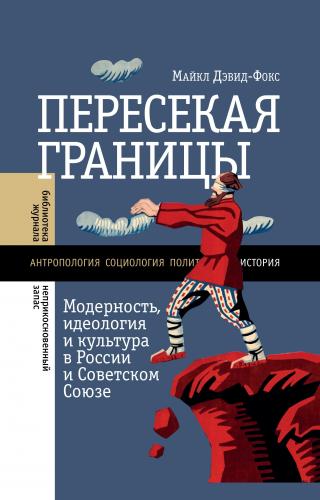Пересекая границы. Модерность, идеология и культура в России и Советском Союзе. Майкл Дэвид-Фокс
P. A Sociology of Modernity: Liberty and Discipline. London: Routledge, 2004. P. 66, 101. «Организованная модерность» Вагнера восходит к термину Хильфердинга «организованный капитализм» (68, 211, сноска 45).
136
Kotsonis Y. Introduction: A Modern Paradox – Subjects and Citizen in Nineteenth- and Twentieth Century Russia // Russian Modernity: Politics, Knowledge, Practices / ed. Y. Kotsonis, D.L. Hoffmann. New York: St. Martin’s, 2000. P. 1–16, цитата: P. 3.
137
См. в особенности: Holquist P. Making War, Forging Revolution: Russia’s Continuum of Crisis, 1914–1921. Cambridge, MA: Harvard University Press, 2002.
138
См. книгу, в названии которой использована метафора Баумана: Weiner A. (ed.). Landscaping the Human Garden: Twentieth-Century Population Management in Comparative Perspective. Stanford, CA: Stanford University Press, 2003.
139
Kotkin S. Modern Times: The Soviet Union and the Interwar Conjuncture // Kritika. 2001. Vol. 2. № 1. P. 111–164.
140
См.: Beer D. Origins, Modernity, and Resistance in the Historiography of Stalinism // Journal of Contemporary History. Vol. 40. № 2. 2005. P. 363–379.
141
Eisenstadt S.N. Multiple Modernities // Multiple Modernities / ed. S.N. Eisenstadt. New Brunswick, NJ: Transaction Publishers, 2002. P. 1–29, цитата: P. 2–3.
142
Arnason J.P. Communism and Modernity // Multiple Modernities. P. 61–90, цитата: P. 65.
143
Ключевая работа на эту тему: Kotkin S. Magnetic Mountain: Stalinism as a Civilization. Berkeley: University of California Press, 1995.
144
Я имею в виду работы Марка Раеффа, Мартина Малиа, Альфреда Дж. Рибера и Лоры Энгельштейн, о которых речь пойдет ниже.
145
О последней из трех перечисленных областей см.: Gordin M., Hall K., Kojevnikov A. (eds.). Intelligentsia Science: The Russian Century, 1860–1960. University of Chicago Press Journals, September 2008 (Osiris. Book 23).
146
Beer D. Renovating Russia: The Human Sciences and the Fate of Liberal Modernity, 1880–1930. Ithaca, NY: Cornell University Press, 2008. P. 25–26.
147
Hoffmann D.L. Cultivating the Masses: Soviet Social Intervention in Its International Context, 1914–1939. Ithaca, NY: Cornell University Press, 2011. P. 100–101.
148
Koselleck R. The Practice of Conceptual History: Timing, History, Spacing Concepts (Cultural Memory in the Present). Stanford, CA: Stanford University Press, 2002. P. 5.
149
Wittrock B. Modernity: One, None, or Many? European Origins and Modernity as a Global Condition // Multiple Modernities. P. 31–60, здесь P. 44. См. также: Wittrock B., Heilbron J., Magnusson L. The Rise of the Social Sciences and the Formation of Modernity // The Rise of the Social Sciences and the Formation of Modernity: Conceptual Change in Context, 1750–1850 / ed. J. Heilbron, L. Magnusson, B. Wittrock. Dordrecht, Netherlands: Kluwer Academic Publishers, 1998. P. 1–34.
150
Berman M. All That Is Solid Melts into Air: The Experience of Modernity. New York: Simon and Schuster, 1982. Part 4.
151
Rieber A.J. The Sedimentary Society // Between Tsar and People: Educated Society and the Quest for Public Identity in Late Imperial Russia / ed. E.W. Clowes, S.D. Kassow, J.L. West. Princeton, NJ: Princeton University Press, 1991. P. 343–366, цитаты: P. 361–362, 365.
152
Raeff M. The Well-Ordered Police State and the Development of Modernity in Seventeenth- and Eighteenth-Century Europe // American Historical Review. Vol. 80. № 5. 1975. P. 1221–1243, цитаты: P. 1238, 1242; см. также: Raeff M. The Well-Ordered Police State and Institutional Change in the Germanies and Russia, 1600–1800. New Haven, CT: Yale University Press, 1983.
153
Malia M. The Soviet Tragedy: A History of Socialism in Russia, 1917–1991. New York: Free Press, 1994. P. 65; Malia M. Russia under Western Eyes: From the Bronze Horseman to the Lenin Mausoleum. Cambridge, MA: Harvard University Press, 1999. P. 103.
154
Cooper F. Modernity // Colonialism in Question: Theory, Knowledge, History. Berkeley: University of California, 2005. P. 114.
155
Engelstein L. Combined Underdevelopment: Discipline and the Law in Late Imperial and Soviet Russia // American Historical Review. Vol. 98. № 2. 1993. P. 338–353, цитата: P. 343 (примечательно, что в названии этой статьи обыгрывается принадлежащая Троцкому формулировка концепции «комбинированного развития»); Engelstein L. The Keys to Happiness: Sex and the Search for Modernity in Fin-de-Siècle Russia. Ithaca, NY: Cornell University Press, 1992. P. 4.
156
См. классический, вызывающий множество ассоциаций пример: Todes D.P. Darwin without Malthus: The Struggle for Existence in Russian Evolutionary Thought. New York: Oxford University Press, 1989.
157
О «западном стандарте» см.: Engelstein L. Keys to Happiness, 4; об «иллюзии модерности» – Engelstein L. Combined Underdevelopment. P. 353. См. размышления самой Энгельштайн над тем, как она использует понятие модерности, в интервью с ней: An Interview with Laura Engelstein // Kritika. 2014. Vol. 15. № 4. P. 689–690. Исследователи неоднократно говорили об иллюзорности самого понятия западного
